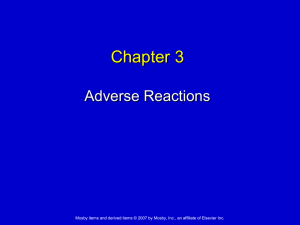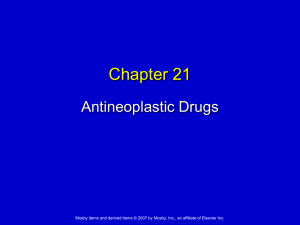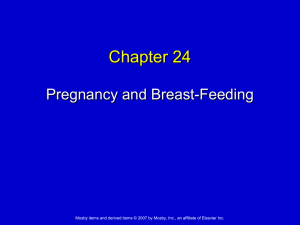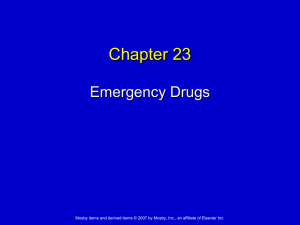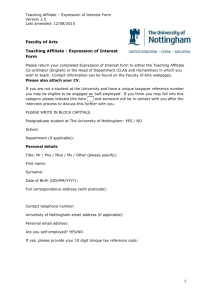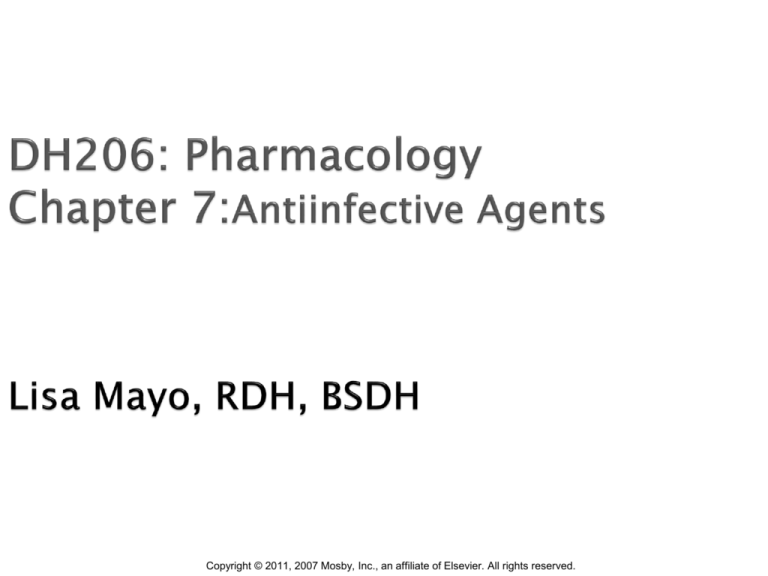
Copyright © 2011, 2007 Mosby, Inc., an affiliate of Elsevier. All rights reserved.
1.
2.
3.
4.
5.
6.
7.
8.
Definitions
ABX & dentistry
Adverse Effects
Bactericidal Antibiotics
Bacteriostatic Antibiotics
Misc Antibiotics
Infective Endocarditis
TB
Copyright © 2011, 2007 Mosby, Inc., an affiliate of Elsevier. All rights reserved.
Copyright © 2011, 2007 Mosby, Inc., an affiliate of Elsevier. All rights reserved.
Antibiotics: substances produced by living
organisms which are harmful to other organisms
◦ Natural or semisynthetic
◦ BacteriCIDAL or bacterioSTATIC
◦ Narrow-Spectrum or Broad-Spectrum
Narrow = Gram (+) only
PEN/MACROLIDE
Broad = Gram (+) & (-)
CLINDAMYCIN
Copyright © 2011, 2007 Mosby, Inc., an affiliate of Elsevier. All rights reserved.
Synergism
◦ Combination produces more than an additive
effect (1 + 1 > 2)
◦ Bactericidal combs are generally synergistic
◦ Bacteriostatic combs usually additive
Antagonism
◦ Occurs when a combination produces less
effect than either agent alone
◦ (1 + 1 < 2)
◦ Bactericidal + bacteriostatic
Copyright © 2011, 2007 Mosby, Inc., an affiliate of Elsevier. All rights reserved.
Copyright © 2011, 2007 Mosby, Inc., an affiliate of Elsevier. All rights reserved.
Perio Therapy
◦ Aggressive perio = systemic abx useful (bacteria invade soft
tissues & cannot be removed through SCRP)
◦ Chronic perio = systemic abx NOT used (Arestin)
Endo Therapy
◦ Uncomplicated = no abx
◦ Lesion spread into soft tissue & is not draining, systemic
involvement = yes abx (PEN VK)
Implants
◦ Pen VK + oral rinse if post-op infection occurs
◦ Peri-implantitis = yes abx
◦ Perio-mucositis = no abx
DO NOT MEMORIZE
TABLE 7-1, TOO
MUCH!
Copyright © 2011, 2007 Mosby, Inc., an affiliate of Elsevier. All rights reserved.
1.
2.
3.
4.
5.
6.
Bacterial Resistance
Superinfections & GI Effects (nausea,
vomiting, diarrhea)
Allergic Reactions
Photosensitivity
Drug Interactions
Pregnancy
Copyright © 2011, 2007 Mosby, Inc., an affiliate of Elsevier. All rights reserved.
1.
Bacterial Resistance
Abx use promotes development of ABX-resistant
bacteria
Increasing problem: culture & sensitivity tests
should be performed before Rx given for an abx
Natural & acquired resistance
Acquired: abx kills some but not all bacteria or
bact mutate
Natural: bact always been resistant
Copyright © 2011, 2007 Mosby, Inc., an affiliate of Elsevier. All rights reserved.
2.
Superinfections & GI Effects
Broad-spectrum abx can eradicate organisms that are
a part of normal flora of GI, mouth, respiratory tract,
vagina
This can allow for growth of other organisms (fungi,
bacteria)
Pseodomembranous colitis causes inflammation of
bowel (common with CLINDY)
Tx for p.colitis: Vancomycin, Metronidazole
ERYTHROMYCIN most common for GI issues
Copyright © 2011, 2007 Mosby, Inc., an affiliate of Elsevier. All rights reserved.
3.
4.
Allergic Reactions
ABX
ALLERGIC POTENTIAL
Penicillin
Cephalosporin
Erythromycin
Clindy
High
Low
Photosensitivity: Sensitivity to UV light
Sunburn easily
CIPRO & DOXYCYCLINE most common
Copyright © 2011, 2007 Mosby, Inc., an affiliate of Elsevier. All rights reserved.
5.
Drug Interactions
All abx can interact with other drugs &
food consumption (can ↑ or ↓ effects)
1) Oral Contraceptives: abx interfere with
metabolism of contraceptives
2) Oral anticoagulants: Abx ↓ bacterial
flora that produce vitamin K (↑
anticoagulant effects) (EXCEPTION TO
RULE: PEN & TETRACYCLINE)
Copyright © 2011, 2007 Mosby, Inc., an affiliate of Elsevier. All rights reserved.
6.
Pregnancy
ABX
Penicillin
Erythromycin
Metronidazole
Tetracycline
PREGNANCY USE
Yes (no teratogenicity)
No
No
Copyright © 2011, 2007 Mosby, Inc., an affiliate of Elsevier. All rights reserved.
A primary concern for using antibiotics for
infections that are not bacterial in nature is that:
a. Drug-resistant microorganisms could develop
b. Drug-drug interactions increase
c. Drug dependence will develop
d. Significant diseases could occur
Copyright © 2011, 2007 Mosby, Inc., an affiliate of Elsevier. All rights reserved.
A primary concern for using antibiotics for
infections that are not bacterial in nature is that:
a. Drug-resistant microorganisms could develop
b. Drug-drug interactions increase
c. Drug dependence will develop
d. Significant diseases could occur
Copyright © 2011, 2007 Mosby, Inc., an affiliate of Elsevier. All rights reserved.
Which of the following defines antimicrobial activity
of an antibiotic that kills sensitive bacteria?
a. Narrow-spectrum
b. Broad-spectrum
c. Bactericidal
d. Bacteriostatic
Copyright © 2011, 2007 Mosby, Inc., an affiliate of Elsevier. All rights reserved.
Which of the following defines antimicrobial activity
of an antibiotic that kills sensitive bacteria?
a. Narrow-spectrum
b. Broad-spectrum
c. Bactericidal
d. Bacteriostatic
Copyright © 2011, 2007 Mosby, Inc., an affiliate of Elsevier. All rights reserved.
All of the following are adverse reactions to
antibiotics EXCEPT which one?
a. Superinfections
b. GI issues
c. Allergic reactions
d. Inhibits bacterial growth
e. Photosensitivity
Copyright © 2011, 2007 Mosby, Inc., an affiliate of Elsevier. All rights reserved.
All of the following are adverse reactions to
antibiotics EXCEPT which one?
a. Superinfections
b. GI issues
c. Allergic reactions
d. Inhibits bacterial growth
e. Photosensitivity
Copyright © 2011, 2007 Mosby, Inc., an affiliate of Elsevier. All rights reserved.
1.
2.
3.
4.
5.
6.
Penicillins
Cephlosporins
Nitroimadazoles
Quinolones(Fluoroquinolones)
Vancomycin
Aminoglycosides
I USE DIFFERENT ORGANIZATION
THAN BOOK – DIVIDED INTO
CIDAL vs STATIC CATEGORIES
Copyright © 2011, 2007 Mosby, Inc., an affiliate of Elsevier. All rights reserved.
P.75-77
1. Penicillin
Discovered by Alexander Fleming
Most all produced from a strain of penicillium
chrysogenumi
Some produced semi-synthetically
Protype: PEN G (most potent penicillin)
Administration: oral, parental
NEVER TOPICAL (allergic rxns)
Copyright © 2011, 2007 Mosby, Inc., an affiliate of Elsevier. All rights reserved.
1.
Penicillin: CHEMISTRY
Penicillins structure
oCan alter the structure by adding various
salts
oHow there are different pen drugs
oMain differences in penicillins
1. Acid stability in the stomach
2. Resistance to enzymatic destruction by
penicillinase & antibacterial spectrum
Copyright © 2011, 2007 Mosby, Inc., an affiliate of Elsevier. All rights reserved.
1.
Penicillin: CHEMISTRY
◦ β-lactam ring fused to a five-member, Scontaining thiazolidine ring
Neither ring has antimicrobial action
◦ Term beta-lactam used to classify penicillin,
cephalosporin, carbapenem, monobactam
antibiotics
◦ Active pen made by adding different functions
grps to position 6 (see next slide)
Copyright © 2011, 2007 Mosby, Inc., an affiliate of Elsevier. All rights reserved.
Copyright © 2011, 2007 Mosby, Inc., an affiliate of Elsevier. All rights reserved.
1.
Penicillin: CHEMISTRY: Beta-Lactam Ring
◦ Responsible for the antibacterial activity
◦ When the β-lactam ring broken = antimicrobial
action is lost
◦ Action
β-lactam ring inhibits bacterial enzymes (called
pen-binding proteins=PBPs) located on bacterial
cell walls= leads to cell death
Resistant bacteria to penicillin’s are able to
produce enzymes (beta-lactamases) that break
open the ring
Copyright © 2011, 2007 Mosby, Inc., an affiliate of Elsevier. All rights reserved.
1.
Penicillin: Spectrum of Activity
◦ Gram (+) primarily (narrow-spectrum)
◦ Some gram (-) (broad-spectrum)
KNOW THIS,
NOT TABLE
7-2
Type of PEN
Examples
Notation
Narrow spectrum
Pen G
Pen V
PROTYPE
Dental infections
Broad spectrum
Amoxicillin
Ampicillin
Premed
Dental infections
Beta-lactamase
inhibitors
Augmentin
Refractory perio
Penicillinaseresistance penicillin
Not used in dentistry
Extended spectrum
Not used in dentistry
Copyright © 2011, 2007 Mosby, Inc., an affiliate of Elsevier. All rights reserved.
1.
Penicillin: USES
P.77
Pen VK & Amox
oMild-Moderate dental infections (endo,
perio, oral surgery)
oSalt of PEN V is called PEN VK: more soluble
than the free acid and better absorbed
when taken orally
oAmox: Premed
Copyright © 2011, 2007 Mosby, Inc., an affiliate of Elsevier. All rights reserved.
1.
Penicillin: PEN RESISTANCE
Certain bacteria have the ability to produce
enzymes that inactivate penicillin’s (narrow & broad
spectrum)
These enzymes are referred to as betalactamases
β-lactamases that inactivate penicillin's are
referred to as penicillinases
Clavulanic acid can be added to AMOX to avoid
destruction by β-lactamase enz = Augmentin
Clavulanic acid has NO antibacterial action, it
allows the β-lactamases to bind with it and this
leave AMOX alone
Copyright © 2011, 2007 Mosby, Inc., an affiliate of Elsevier. All rights reserved.
Clavulanic Acid
β-lactamase Bacteria
β-lactamase
+
AUGMENTIN
AMOX
Bacteria
Copyright © 2011, 2007 Mosby, Inc., an affiliate of Elsevier. All rights reserved.
=
1.
Penicillin: ADVERSE REACTIONS (have wide
margin of safety)
1) Allergic reactions: 10% population
2) GI upset: can use lactobacillus acidophilus
Copyright © 2011, 2007 Mosby, Inc., an affiliate of Elsevier. All rights reserved.
1.
Penicillin: DRUG INTERACTIONS
1) PEN + Bacteriostatic ABX = PEN not as
effective
2) Birth control
3) Probencid (gout drug) = ↑levels PEN in blood
by ↓ renal elimination
Copyright © 2011, 2007 Mosby, Inc., an affiliate of Elsevier. All rights reserved.
1.
2.
3.
4.
5.
6.
Penicillin's
Cephlosporins
Nitroimadazoles
Quinolones(Fluoroquinolones)
Vancomycin
Aminoglycosides
Copyright © 2011, 2007 Mosby, Inc., an affiliate of Elsevier. All rights reserved.
P.77-78
2.
Cephalosporins
Structurally similar to penicillins
Have a β–lactam ring
Broad spectrum
X-hypersensitivity possible w/PEN
Uses
Skin, bone, GI, Respiratory, ear infections
NOT indicated for endo/perio infections (PEN
used)
Copyright © 2011, 2007 Mosby, Inc., an affiliate of Elsevier. All rights reserved.
2.
Cephalosporins
Book correction: 4-generations, not 3
Adverse rxns same as PEN
Drug interactions: same as PEN except add
Warfarin
Actions of Warfarin may be increased
Copyright © 2011, 2007 Mosby, Inc., an affiliate of Elsevier. All rights reserved.
2.
Cephalosporins
First generation
cefadroxil(Duricef)
cephalexin(Keflex)
Second generation cefaclor(Ceclor)
cefuroxime-axetil(Ceftin, Veftin)
Third generation
omnicef(Cefdinir)
cefixime(Suprax)
ceftibuten(Cedax)
Fourth generation
Only injectable
Copyright © 2011, 2007 Mosby, Inc., an affiliate of Elsevier. All rights reserved.
Which of the following antibiotics is considered a
broad-spectrum cephalosporin-type antibiotic?
a.
b.
c.
d.
Pen VK
Cefaclor (Ceclor)
Clindamycin
Erythromycin
Copyright © 2011, 2007 Mosby, Inc., an affiliate of Elsevier. All rights reserved.
Which of the following antibiotics is considered a
broad-spectrum cephalosporin-type antibiotic?
a.
b.
c.
d.
Pen VK
Cefaclor (Ceclor)
Clindamycin
Erythromycin
Copyright © 2011, 2007 Mosby, Inc., an affiliate of Elsevier. All rights reserved.
1.
2.
3.
4.
5.
6.
Penicillin's
Cephlosporins
Nitroimadazoles
Quinolones(Fluoroquinolones)
Vancomycin
Aminoglycosides
Copyright © 2011, 2007 Mosby, Inc., an affiliate of Elsevier. All rights reserved.
3.
Metronidazole(Flagyl)
Effective against bacteria & protozoa (NBQ)
Can tx vaginal & resp infections
Antiinflammatory effects
Used in tx of Pseudomembranous colitis
P.82-83
Copyright © 2011, 2007 Mosby, Inc., an affiliate of Elsevier. All rights reserved.
3.
Metronidazole(Flagyl): USES
NUG
Peri-implantitis
Refractory/aggressive perio: can be used
in combo w/AMOX or AUGMENTIN
oGood against Aa and Pg
Copyright © 2011, 2007 Mosby, Inc., an affiliate of Elsevier. All rights reserved.
3.
Metronidazole(Flagyl): ADVERSE EFFECTS
GI
Metallic taste
Dry mouth
Darkened urine
Copyright © 2011, 2007 Mosby, Inc., an affiliate of Elsevier. All rights reserved.
3.
Metronidazole(Flagyl): DRUG INTERCATIONS
Alcohol
o Produces a reaction similar to when a recovering
alcoholic drinks while taking disulfiram
(Antabuse)
o NO ALCOHOL for 3 days after abx stopped
Lithium (bipolar)
Cimetidine (antiulcer drug)
Warfarin: cause ↑ bleeding
Copyright © 2011, 2007 Mosby, Inc., an affiliate of Elsevier. All rights reserved.
Which of the following drugs is contraindicated
while a patient is taking metronidazole?
a. Penicillin
b. Alcohol
c. Aspirin
d. Mushrooms
Copyright © 2011, 2007 Mosby, Inc., an affiliate of Elsevier. All rights reserved.
Which of the following drugs is contraindicated
while a patient is taking metronidazole?
a. Penicillin
b. Alcohol
c. Aspirin
d. Mushrooms
Copyright © 2011, 2007 Mosby, Inc., an affiliate of Elsevier. All rights reserved.
1.
2.
3.
4.
5.
6.
Penicillin's
Cephlosporins
Nitroimadazoles
Quinolones(Fluoroquinolones)
Vancomycin
Aminoglycosides
Copyright © 2011, 2007 Mosby, Inc., an affiliate of Elsevier. All rights reserved.
P.86
4. Quinolones(Fluoroquinolones)
Most common: CIPROFLOXACIN
Inhibit bacterial DNA replication
Facultative gram (-) anaerobes
USES
oSinusitis, acute bronchitis
oSkin, eye infections, UTI
oChronic perio
Copyright © 2011, 2007 Mosby, Inc., an affiliate of Elsevier. All rights reserved.
4. Quinolones(Fluoroquinolones)
Calcium products taken 4 hours before or 2
hours after CIPRO
Drug Interactions
oWarfarin
oTheophylline (asthma drug)
oCaffeine
Copyright © 2011, 2007 Mosby, Inc., an affiliate of Elsevier. All rights reserved.
4. Quinolones(Fluoroquinolones)
end in ~floxacin
Quinolones(Fluoroquinolones)
ciprofloxacin(Cipro)
norfloxacin(Noroxin)
enoxacin(Pentrex)
lomefloxacin(Maxaquin)
ofloxacin(Floxin)
levofloxacin(Levaquin)
Moxifloxacin(Avelox)
Copyright © 2011, 2007 Mosby, Inc., an affiliate of Elsevier. All rights reserved.
Which of the following is the mode of action for
Cephalosporins?
a. Interfere with bacterial protein synthesis
b. Affect bacterial cell wall
c. Interfere with normal biosynthetic
pathways in bacteria
d. None of the above
Copyright © 2011, 2007 Mosby, Inc., an affiliate of Elsevier. All rights reserved.
Which of the following is the mode of action for
Cephalosporins?
a. Interfere with bacterial protein synthesis
b. Affect bacterial cell wall
c. Interfere with normal biosynthetic
pathways in bacteria
d. None of the above
Copyright © 2011, 2007 Mosby, Inc., an affiliate of Elsevier. All rights reserved.
Which antibiotic/antimicrobial is associated with
the highest incidence of drug allergy?
a.
b.
c.
d.
Ciprofloxacin (Cipro)
Pen VK
Clindamycin
Metronidazole (Flagyl)
Copyright © 2011, 2007 Mosby, Inc., an affiliate of Elsevier. All rights reserved.
Which antibiotic/antimicrobial is associated with
the highest incidence of drug allergy?
a.
b.
c.
d.
Ciprofloxacin (Cipro)
Pen VK
Clindamycin
Metronidazole (Flagyl)
Copyright © 2011, 2007 Mosby, Inc., an affiliate of Elsevier. All rights reserved.
Levofloxacin (Levaquin) has which of the following
modes of action?
a. Affects bacterial cell wall
b. Affects bacterial DNA
c. Interferes with bacterial protein synthesis
d. Interferes with bacterial metabolic pathways
Copyright © 2011, 2007 Mosby, Inc., an affiliate of Elsevier. All rights reserved.
Levofloxacin (Levaquin) has which of the following
modes of action?
a. Affects bacterial cell wall
b. Affects bacterial DNA
c. Interferes with bacterial protein synthesis
d. Interferes with bacterial metabolic pathways
Copyright © 2011, 2007 Mosby, Inc., an affiliate of Elsevier. All rights reserved.
1.
2.
3.
4.
5.
6.
Penicillin's
Cephlosporins
Nitroimadazoles
Quinolones(Fluoroquinolones)
Vancomycin
Aminoglycosides
Copyright © 2011, 2007 Mosby, Inc., an affiliate of Elsevier. All rights reserved.
5.
Vancomycin(Vancocin)
Use is increasing
Gram (+)
Adverse Effect: red-man syndrome (NBQ)
Uses: pseudomembranous colitis (NBQ)
Copyright © 2011, 2007 Mosby, Inc., an affiliate of Elsevier. All rights reserved.
1.
2.
3.
4.
5.
6.
Penicillin's
Cephlosporins
Nitroimadazoles
Quinolones(Fluoroquinolones)
Vancomycin
Aminoglycosides
Copyright © 2011, 2007 Mosby, Inc., an affiliate of Elsevier. All rights reserved.
6.
Aminoglycosides
Bactericidal
Gram (-) aerobic
Inhibits PRO-synthesis on 30S ribosome
USES
Hospitalized patients with serious gram (-)
infections
Copyright © 2011, 2007 Mosby, Inc., an affiliate of Elsevier. All rights reserved.
6.
Aminoglycosides
Aminoglycoside
USES
streptomycin
TB tx when other drugs have failed
neomycin
Topical
gentamycin
Topical
tobramycin
Injection
amikacin
Injection
Copyright © 2011, 2007 Mosby, Inc., an affiliate of Elsevier. All rights reserved.
Which of the following antibiotics are useful in
treating odontogenic infections?
a.
b.
c.
d.
e.
Azithromycin (Zithromax, Z-pak)
Clindamycin
Pen VK
Cephalexin (Keflex)
All the above
Copyright © 2011, 2007 Mosby, Inc., an affiliate of Elsevier. All rights reserved.
Which of the following antibiotics are useful in
treating odontogenic infections?
a.
b.
c.
d.
e.
Azithromycin (Zithromax, Z-pak)
Clindamycin
Pen VK
Cephalexin (Keflex)
All the above
Copyright © 2011, 2007 Mosby, Inc., an affiliate of Elsevier. All rights reserved.
1.
2.
3.
4.
Macrolides
Lincomycins (Clindamycin)
Tetracyclines
Sulfanamides
Copyright © 2011, 2007 Mosby, Inc., an affiliate of Elsevier. All rights reserved.
1. Macrolides
P.78
Inhibit multiplication of bacteria by reversibly
binding to the 50S ribosomal subunit of bacteria
o This action inhibits PRO synthesis of the bacterial
cell
Excreted by bile, not urine
Most common adverse effect: GI upset
USE
o Sinusitis, ear infections
o Gonorrhea, community-acquired pneumonia, PID,
chlamydia, diphtheria
Copyright © 2011, 2007 Mosby, Inc., an affiliate of Elsevier. All rights reserved.
1. Macrolides
Generation
Macrolide
Notations
First
generation
Erythromycin
• Gram (+) & (-)
• Used when pt’s
allergic to PEN
Second
generation
Clarithromycin(Biaxin)
Azithromycin(Zithromax,
Z-Pak)
• Broader spectrum
than 1st generation
• Fewer adverse effects
• Azithro: useful in
perio disease tx,
antinflammatory
Copyright © 2011, 2007 Mosby, Inc., an affiliate of Elsevier. All rights reserved.
1. Macrolides: DRUG INTERACTIONS
Potential to inhibit drug metabolism of other
drugs through inactivation of P-450 enzyme
system
Antacids ↓ effectiveness of macrolides
Copyright © 2011, 2007 Mosby, Inc., an affiliate of Elsevier. All rights reserved.
1.
2.
3.
4.
Macrolides
Lincomycins (Clindamycin)
Tetracyclines
Sulfanamides
Copyright © 2011, 2007 Mosby, Inc., an affiliate of Elsevier. All rights reserved.
2. Lincomycins
P.82
Clindamycin(Cleocin)
Inhibits PRO synthesis of 50S ribosome like
Macrolides
USES
oPerio abscess or perio disease
oChronic bronchitis, community-acquired
pneumonia, sinusitis
oPremed
Copyright © 2011, 2007 Mosby, Inc., an affiliate of Elsevier. All rights reserved.
2. Lincomycins
Adverse effects: pseudomembranous colitis
o Many dentists avoid Clindy as a 1st line drug
due to this side effect
o Disease can be fatal (persistent diarrhea)
Contraindications
o Crohn’s disease
o Ulcerative colitis
Copyright © 2011, 2007 Mosby, Inc., an affiliate of Elsevier. All rights reserved.
An overgrowth of which of the following organisms
is responsible for antibiotic-associated diarrhea?
a.
b.
c.
d.
Streptococci mutans
Mucobacterium tuberculosis
Clostridium difficile
Staphylococci aureus
Copyright © 2011, 2007 Mosby, Inc., an affiliate of Elsevier. All rights reserved.
An overgrowth of which of the following organisms
is responsible for antibiotic-associated diarrhea?
a.
b.
c.
d.
Streptococci mutans
Mucobacterium tuberculosis
Clostridium difficile
Staphylococci aureus
Copyright © 2011, 2007 Mosby, Inc., an affiliate of Elsevier. All rights reserved.
1.
2.
3.
4.
Macrolides
Lincomycins (Clindamycin)
Tetracyclines
Sulfanamides
Copyright © 2011, 2007 Mosby, Inc., an affiliate of Elsevier. All rights reserved.
3. Tetracyclines
Broad spectrum
Mechanism of Action
o Inhibit PRO synthesis at 30S ribosome (not 50S
like macrolides, clindy)
o Inhibit host production of collagenase in cells
such as PMNs
Collagenase: enzyme that makes up connective
tissue of periodontium
o Concentrate in GCF & maintain high substantivity
on root surfaces
o Found in saliva & breast milk
Copyright © 2011, 2007 Mosby, Inc., an affiliate of Elsevier. All rights reserved.
3. Tetracyclines
Copyright © 2011, 2007 Mosby, Inc., an affiliate of Elsevier. All rights reserved.
3. Tetracycline: ADVERSE EFFECTS
oStain teeth
oMinocycline: blue/gray
oTetracycline: yellow/brown
oSkin hyperpigmentation
oMinocycline: dizziness
Copyright © 2011, 2007 Mosby, Inc., an affiliate of Elsevier. All rights reserved.
3. Tetracyclines
CANNOT take with milk (next slide)
Take with full glass water to prevent ulcers
USES
oChronic, refractory & aggressive perio
disease
oChlamydia, syphilis, traveler’s diarrhea
o Helicobacter pylori
oAcne
Copyright © 2011, 2007 Mosby, Inc., an affiliate of Elsevier. All rights reserved.
3. Tetracyclines: DRUG INTERACTIONS
o Dairy products: tetracycline binds with calcium &
this will inhibit absorption of drug
o Antacids delay absorption tetracyclines
o Warfarin
o Oral sulfonylureas – can lead to hypoglycemia
o DO NOT use during pregnancy
o Should NOT be use in last ½ of pregnancy or in
kids <9yrs (NBQ) Mosby’s says 7-12yrs
Copyright © 2011, 2007 Mosby, Inc., an affiliate of Elsevier. All rights reserved.
1.
2.
3.
4.
Macrolides
Lincomycins (Clindamycin)
Tetracyclines
Sulfanamides
Copyright © 2011, 2007 Mosby, Inc., an affiliate of Elsevier. All rights reserved.
4. Sulfonamides
Bacteria have an essential requirement for
paraaminobenzoic acid (PABA) which is folic
acid
Sulfonamides are competitive antagonists of
PABA
Block synthesis of folic acid
↓
Inhibits bacterial growth
↓
Produces bacteriostatic effect
Copyright © 2011, 2007 Mosby, Inc., an affiliate of Elsevier. All rights reserved.
4. Sulfonamides
USES
o Otis media
o UTI
o Pneumocystis carinii in AIDS patients
(pneumonia)
DRUG INTERCATIONS
o Warfarin
ADVERSE EFFECTS
o Stomatitis
o Skin rash
o Sulfa allergy rxn
Copyright © 2011, 2007 Mosby, Inc., an affiliate of Elsevier. All rights reserved.
4. Sulfonamides
Sulfonamides
sulfisoxazole+trimethoprim(Bactrim)
Most common
sulfadiazine(Microsulfron)
sulfamethoxazole(Gantanol)
sulfisoxazole(Gantrisin)
trimethoprim(Proloprim)
Copyright © 2011, 2007 Mosby, Inc., an affiliate of Elsevier. All rights reserved.
Sulfonamides (also known as sulfa drugs) are
structurally similar to:
a.
b.
c.
d.
Penicillins
Erythromycins
Salicylic acid
Para-aminobenzoic acid (PABA)
Copyright © 2011, 2007 Mosby, Inc., an affiliate of Elsevier. All rights reserved.
Sulfonamides (also known as sulfa drugs) are
structurally similar to:
a.
b.
c.
d.
Penicillins
Erythromycins
Salicylic acid
Para-aminobenzoic acid (PABA)
Copyright © 2011, 2007 Mosby, Inc., an affiliate of Elsevier. All rights reserved.
All of the following antibiotics have been used
in the treatment of aggressive periodontitis
EXCEPT which one?
a.
b.
c.
d.
Clindamycin
Ciprofloxacin
Erythromycin
Doxycycline
Copyright © 2011, 2007 Mosby, Inc., an affiliate of Elsevier. All rights reserved.
All of the following antibiotics have been used
in the treatment of aggressive periodontitis
EXCEPT which one?
a.
b.
c.
d.
Clindamycin
Ciprofloxacin
Erythromycin
Doxycycline
Copyright © 2011, 2007 Mosby, Inc., an affiliate of Elsevier. All rights reserved.
Which of the following is the mode of action of
the Tetracyclines?
a. Bacterial cell wall destruction
b. Prevent protein synthesis in the bacterial cell
c. Interfere with nucleic acid syntheiss in the bacterial
cell
d. Cause mutations within bacterial DNA
Copyright © 2011, 2007 Mosby, Inc., an affiliate of Elsevier. All rights reserved.
Which of the following is the mode of action of
the Tetracyclines?
a. Bacterial cell wall destruction
b. Prevent protein synthesis in the bacterial cell
c. Interfere with nucleic acid syntheiss in the bacterial
cell
d. Cause mutations within bacterial DNA
Copyright © 2011, 2007 Mosby, Inc., an affiliate of Elsevier. All rights reserved.
Which antibiotic below is associated with the adverse effect
of pseudomembranous colitis?
a.
b.
c.
d.
e.
Pen VK
Erythromycin
Tetracycline
Cephalexin (Keflex)
Clindamycin
Copyright © 2011, 2007 Mosby, Inc., an affiliate of Elsevier. All rights reserved.
Which antibiotic below is associated with the adverse effect
of pseudomembranous colitis?
a.
b.
c.
d.
e.
Pen VK
Erythromycin
Tetracycline
Cephalexin (Keflex)
Clindamycin
Copyright © 2011, 2007 Mosby, Inc., an affiliate of Elsevier. All rights reserved.
Which antimicrobial is associated with
photosensitivity?
a. Tetracycline
b. Pen VK
c. Metronidazole (Flagyl)
d. Clindamycin
Copyright © 2011, 2007 Mosby, Inc., an affiliate of Elsevier. All rights reserved.
Which antimicrobial is associated with
photosensitivity?
a. Tetracycline
b. Pen VK
c. Metronidazole (Flagyl)
d. Clindamycin
Copyright © 2011, 2007 Mosby, Inc., an affiliate of Elsevier. All rights reserved.
Which of the following rugs can be used in a
pregnant patient?
a.
b.
c.
d.
Tetracycline
Pen VK
Doxycycline
Minocycline
Copyright © 2011, 2007 Mosby, Inc., an affiliate of Elsevier. All rights reserved.
Which of the following rugs can be used in a
pregnant patient?
a.
b.
c.
d.
Tetracycline
Pen VK
Doxycycline
Minocycline
Copyright © 2011, 2007 Mosby, Inc., an affiliate of Elsevier. All rights reserved.
Copyright © 2011, 2007 Mosby, Inc., an affiliate of Elsevier. All rights reserved.
CONDITIONS REQUIRING PREMED PER AHA
1. Artificial heart valves
2. Hx IE
3. Congenital heart conditions
4. Cardiac transplant that develops a problem in a
heart valve
Copyright © 2011, 2007 Mosby, Inc., an affiliate of Elsevier. All rights reserved.
Premed drugs: taken 30-60min prior to dental
appt
Alpha-hemolytic streptococci most common agent
that causes IE
o Reason why AMOX best drug to prevent IE
Recommended 7 days between dental appts for
patients that need premed
Copyright © 2011, 2007 Mosby, Inc., an affiliate of Elsevier. All rights reserved.
SITUATION
DRUG
DOSE ADULTS
DOSE
KIDS
Oral
AMOX
2g
50mg
Unable to take
oral meds
Ampicillin
Cephalosporins
2g parental
1g parental
50mg
50mg
Allergic to
pen/ampicillin
Cephalexin(Keflex)
Clindamycin
Azithromycin or clarithromycin
2g
600mg
500mg
50mg
20mg
15mg
Allergic to
pen/ampicillin
& unable to
take oral meds
Cephalosporins
Clindamycin
1g
600mg
50mg
20mg
(cefazolin, ceftriaxone)
(cefazolin, ceftriaxone)
HAVE TO KNOW EVERYTHING ON
THIS GRAPH!!
Copyright © 2011, 2007 Mosby, Inc., an affiliate of Elsevier. All rights reserved.
Which of the following 2 penicillins are
recommended by the AHA to prevent
endocarditis in patients undergoing invasive
dental procedures?
a.
b.
c.
d.
Penicillin VK
Ampicillin (Polycillin)
Cloxacillin
Amoxicillin (Amoxil)
Copyright © 2011, 2007 Mosby, Inc., an affiliate of Elsevier. All rights reserved.
Which of the following 2 penicillins are
recommended by the AHA to prevent
endocarditis in patients undergoing invasive
dental procedures?
a.
b.
c.
d.
Penicillin VK
Ampicillin (Polycillin)
Cloxacillin
Amoxicillin (Amoxil)
Copyright © 2011, 2007 Mosby, Inc., an affiliate of Elsevier. All rights reserved.
Your patient is taking erythromycin twice daily for 1
month for an upper respiratory tract infection. She
has a history that requires antibiotic prophylaxis prior
to probing/scaling. She is allergic to penicillin.
Which of the following antibiotics could be used is
you had to premedicate while taking erythromycin?
a. Ampicillin
b. Cephalexin (Keflex)
c. Azithromycin (Zithromax)
d. Pen VK
Copyright © 2011, 2007 Mosby, Inc., an affiliate of Elsevier. All rights reserved.
Your patient is taking erythromycin twice daily for 1
month for an upper respiratory tract infection. She
has a history that requires antibiotic prophylaxis prior
to probing/scaling. She is allergic to penicillin.
Which of the following antibiotics could be used is
you had to premedicate while taking erythromycin?
a. Ampicillin
b. Cephalexin (Keflex)
c. Azithromycin (Zithromax)
d. Pen VK
Copyright © 2011, 2007 Mosby, Inc., an affiliate of Elsevier. All rights reserved.
Which of the following antibiotics can be used for
prophylaxis against IE if a patient is allergic to
penicillin?
a. Ampicillin
b. Erythromycin
c. Azithromycin
d. Doxycycline
Copyright © 2011, 2007 Mosby, Inc., an affiliate of Elsevier. All rights reserved.
Which of the following antibiotics can be used for
prophylaxis against IE if a patient is allergic to
penicillin?
a. Ampicillin
b. Erythromycin
c. Azithromycin
d. Doxycycline
Copyright © 2011, 2007 Mosby, Inc., an affiliate of Elsevier. All rights reserved.
Copyright © 2011, 2007 Mosby, Inc., an affiliate of Elsevier. All rights reserved.
TB is caused by the acid-fast bacterium
Mycobacterium tuberculosis
Treatment is difficult for several reasons
1. Patient inadequate defense mechanisms
2. Tubercle bacilli resistant strains
3. Most of the drugs available are not
bactericidal
4. Drugs toxic so cannot be used in sufficient
doses
5. Patient compliance: long-term tx, 3-4 drugs
for tx
Copyright © 2011, 2007 Mosby, Inc., an affiliate of Elsevier. All rights reserved.
Drugs
1.
2.
3.
4.
5.
isoniazid(INH)
rifampin(Rifadin)
pyrazinamide(PZA)
ethambutol(Myambutol)
Streptomycin
Copyright © 2011, 2007 Mosby, Inc., an affiliate of Elsevier. All rights reserved.
isoniazid(INH)
Drug of choice
1st drug used and taken for 9 months
rifampin(Rifadin) + pyrazinamide(PZA)
Taken for 2 months in combo with each other & INH
rifampin used alone for 4 months ONLY (resistance
develops quickly
ethambutol(Myambutol)
Use for 1st 2mo
Resistance develops quickly
Last resort drug
Aminoglycoside: Streptomycin
Used when other ABX have failed
Copyright © 2011, 2007 Mosby, Inc., an affiliate of Elsevier. All rights reserved.
DRUG ADVERSE EFFECTS (NBQ)
isoniazid(INH)
Hepatitis: ↑ risk with alcohol & acetaminophen
use
Anemia
Pyridoxine(B6) deficiency: causes peripheral
neuropathy (numbness fingers/toes)
Copyright © 2011, 2007 Mosby, Inc., an affiliate of Elsevier. All rights reserved.
All of the following drugs are useful for treating
tuberculosis EXCEPT which one?
a.
b.
c.
d.
e.
f.
Isoniazid
Streptomycin
Rifampin
Erythromycin
Ethambutol
Pyrazinamide
Copyright © 2011, 2007 Mosby, Inc., an affiliate of Elsevier. All rights reserved.
All of the following drugs are useful for treating
tuberculosis EXCEPT which one?
a.
b.
c.
d.
e.
f.
Isoniazid
Streptomycin
Rifampin
Erythromycin
Ethambutol
Pyrazinamide
Copyright © 2011, 2007 Mosby, Inc., an affiliate of Elsevier. All rights reserved.
Which of the following serum-level parameters
should be monitored in the tuberculosis patient
taking INH?
a.
b.
c.
d.
Liver enzymes
Sodium chloride
Calcium ions
Potassium
Copyright © 2011, 2007 Mosby, Inc., an affiliate of Elsevier. All rights reserved.
Which of the following serum-level parameters
should be monitored in the tuberculosis patient
taking INH?
a.
b.
c.
d.
Liver enzymes
Sodium chloride
Calcium ions
Potassium
Copyright © 2011, 2007 Mosby, Inc., an affiliate of Elsevier. All rights reserved.
Which of the following is also referred to as INH?
a.
b.
c.
d.
e.
Rifamin
Isoniazid
Ethambutol
Fluroquinolone
Pyrazinamide
Copyright © 2011, 2007 Mosby, Inc., an affiliate of Elsevier. All rights reserved.
Which of the following is also referred to as INH?
a.
b.
c.
d.
e.
Rifamin
Isoniazid
Ethambutol
Fluroquinolone
Pyrazinamide
Copyright © 2011, 2007 Mosby, Inc., an affiliate of Elsevier. All rights reserved.
Which of the following TB drugs cause red/orange
saliva?
a.
b.
c.
d.
e.
Rifamin
Isoniazid
Ethambutol
Fluroquinolone
Pyrazinamide
Copyright © 2011, 2007 Mosby, Inc., an affiliate of Elsevier. All rights reserved.
Which of the following TB drugs cause red/orange
saliva?
a.
b.
c.
d.
e.
Rifamin
Isoniazid
Ethambutol
Fluroquinolone
Pyrazinamide
Copyright © 2011, 2007 Mosby, Inc., an affiliate of Elsevier. All rights reserved.
A MAJOR problem with anti-TB drugs is:
a.
b.
c.
d.
Many drugs are toxic to normal cells in the body
Many drugs are not specific enough to kill the bacteria
Drug resistance
Drug dependence
Copyright © 2011, 2007 Mosby, Inc., an affiliate of Elsevier. All rights reserved.
A MAJOR problem with anti-TB drugs is:
a.
b.
c.
d.
Many drugs are toxic to normal cells in the body
Many drugs are not specific enough to kill the bacteria
Drug resistance
Drug dependence
Copyright © 2011, 2007 Mosby, Inc., an affiliate of Elsevier. All rights reserved.

